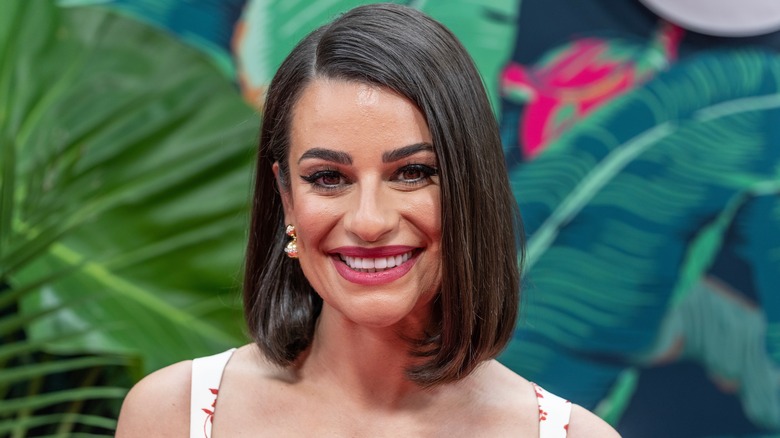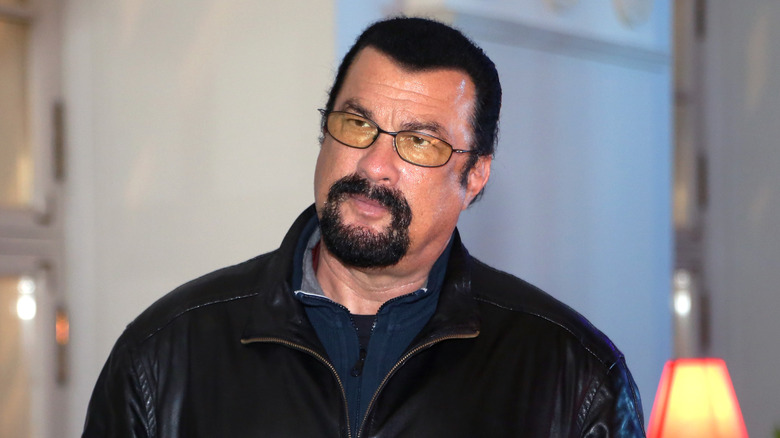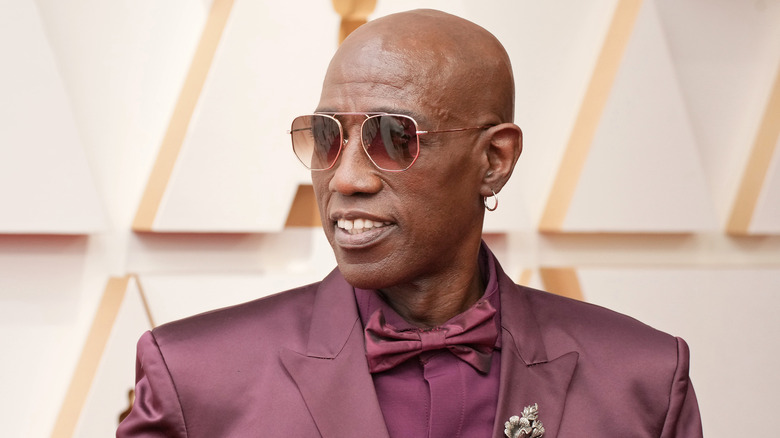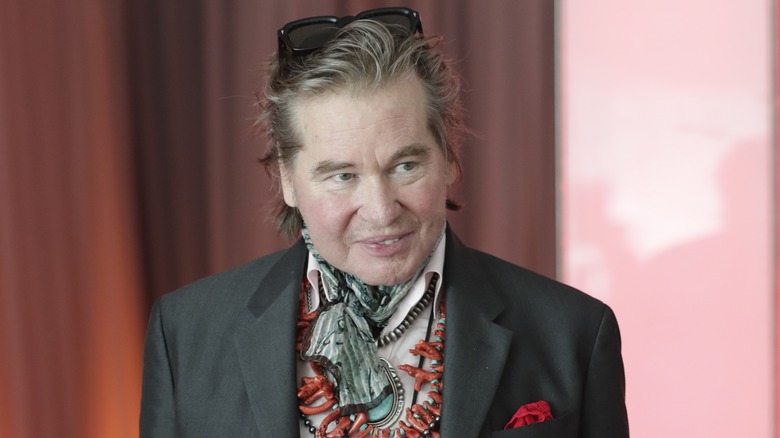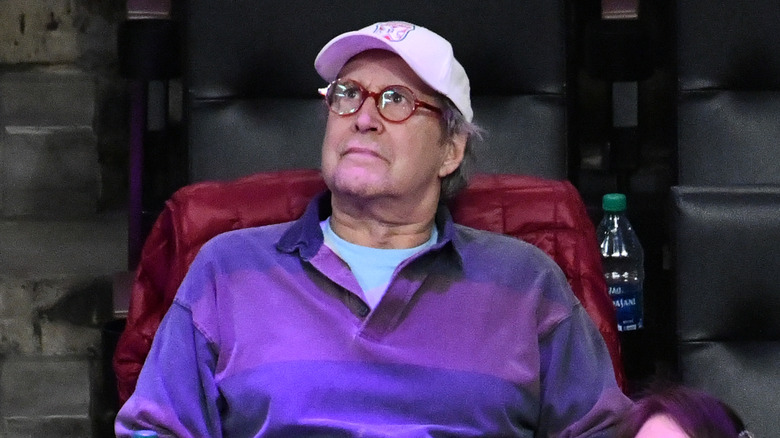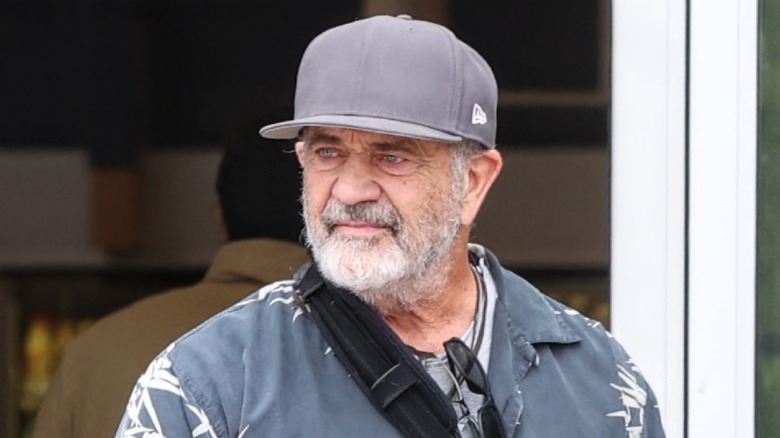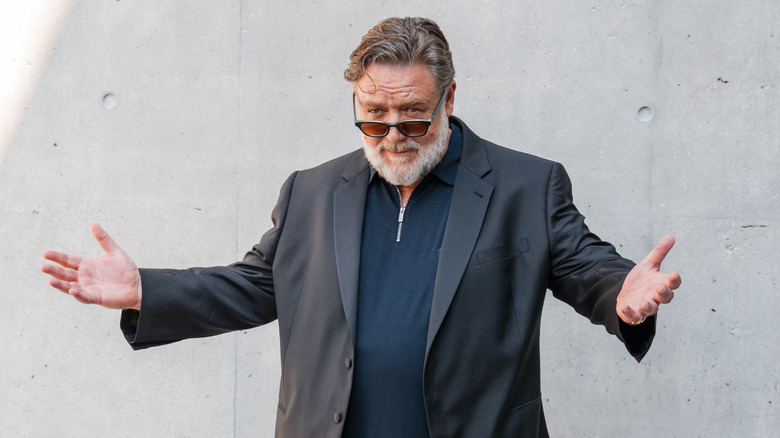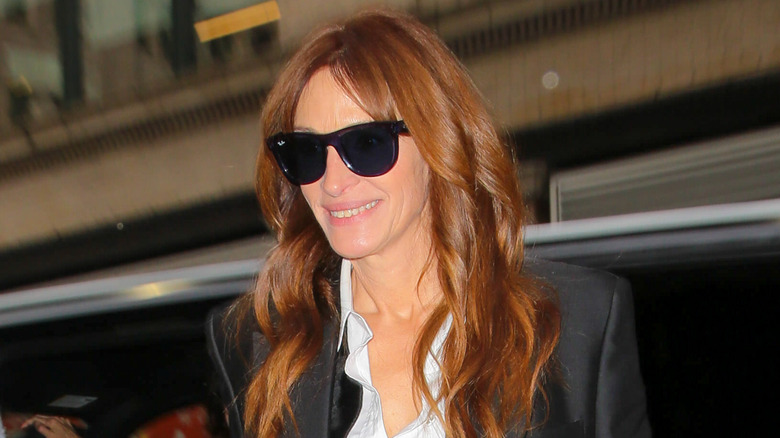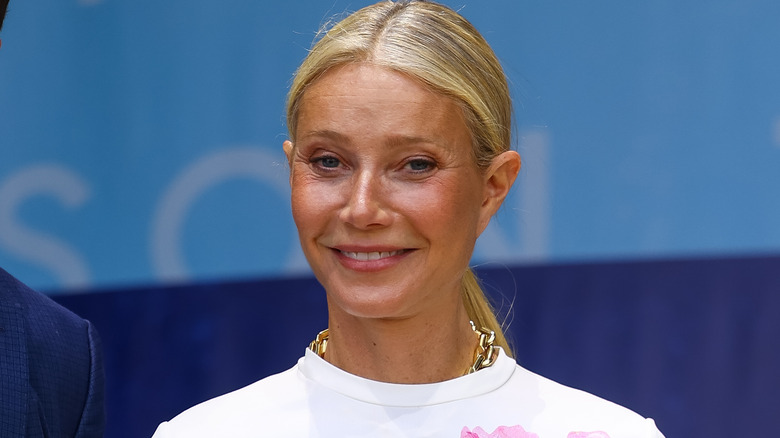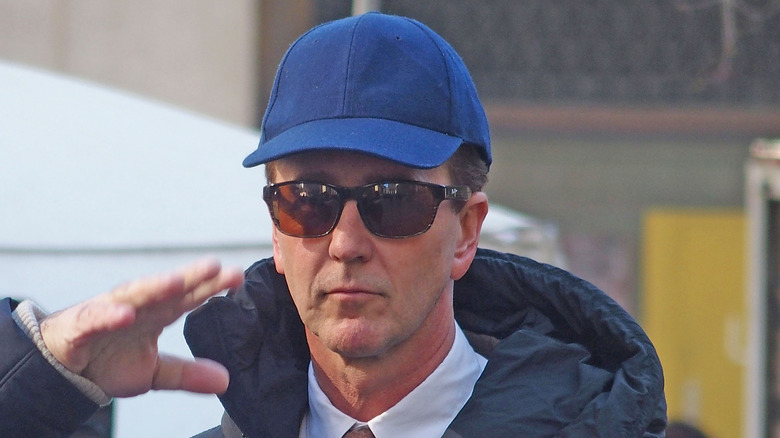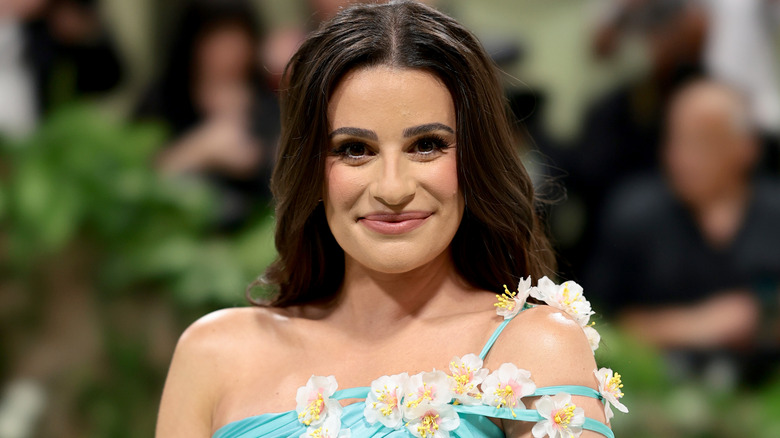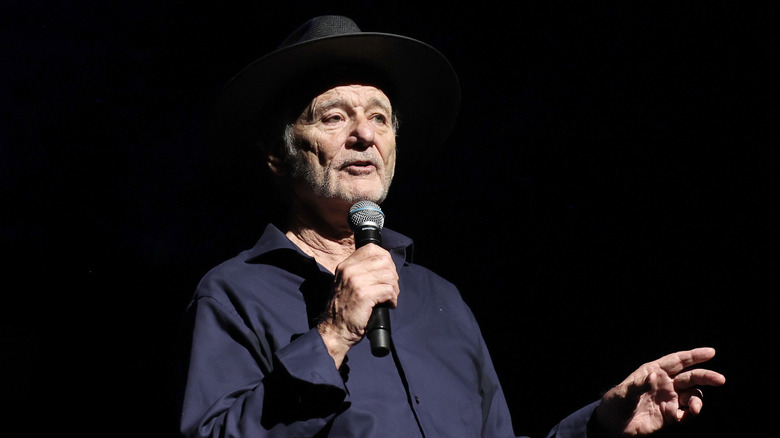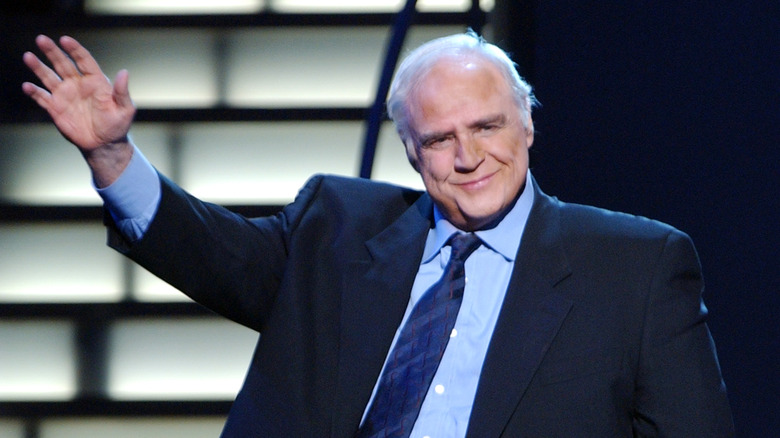Actors Who Are Terrors To Their Co-Stars
One might think that being a famous actor would be the greatest job in the world, but like any job, it comes with a certain amount of pressure and stress — and since they are just as human as everyone else, every actor responds to that stress differently. When things get real on the film set, a few positive, supportive words for the supporting cast and crew from the movie's star can go a long way toward keeping the production on track. Conversely, a major temper tantrum from an A-list prima donna can have exactly the opposite effect.
It's no secret that some of our favorite stars can be a bit difficult to work with, but there are a few actors who took things too far on set and whose reputations for bringing non-fictional drama, conflict, and even violence to work with them are well-earned. Here are some folks who have been absolute terrors to their co-stars.
Steven Seagal
In the '80s and '90s, aikido master Steven Seagal was known for two things: an acting style that could charitably be described as labored, and being utterly convincing onscreen as a man who could snap any bone in your body with minimal effort. After his star waned, Seagal continued to crank out low-budget actioners, and if he seemed to have trouble getting co-stars of the non-D-list variety to join him in his endeavors, it may be because there are enough famous people who can't stand Steven Seagal to field a football team.
It seems that Seagal has, put simply, a tendency to be a real jerk to his castmates in a multitude of ways, and many of them have been happy to talk about it. There's Julianna Margulies, who labeled Seagal a "predator" due to an experience with him in a hotel room while casting for 1991's "Out for Justice" (via CBC). There's beloved character actor Stephen Tobolowsky, who related to Cut how Seagal attempted to shoehorn in impossible mid-production changes to 1996's "The Glimmer Man," to the chagrin of his castmates. There's the late rapper-slash-actor and "Exit Wounds" co-star DMX, who told now-defunct website Rap Dirt (via Fandom Wire) that Seagal spoke to him "like an old slave master." And there's John Leguizamo, who told Q with Tom Power that Seagal straight-up assaulted him on set; Seagal hasn't starred in a feature since 2019, which is probably for the best.
Wesley Snipes
There are a few untold truths about Wesley Snipes, most recently that he officially (sort of) became the longest-running actor in the MCU by reprising the role of Blade — which he originated in 1998 — in 2024's "Deadpool and Wolverine." It's a good thing he brought the Daywalker back for one more round, too, because his last appearance — in 2004's "Blade: Trinity" — was not terribly well-received. In a conversation with the AV Club, comedian Patton Oswalt, who played a bit part in the film, described how everyone on set was just trying to make the experience fun — everyone except Snipes, who did his best to make it a nightmare.
Oswalt shared that Snipes' feuding with the film's director, David S. Goyer, went to ridiculous extremes. For starters, the star basically refused to come out of his trailer ("he would smoke weed all day," Oswalt said) except for close-ups, letting his stand-in do most of the work. Snipes also accused Goyer of being racist, eventually stopped communicating with him except via Post-It notes, and finally (allegedly) boiled over and tried to strangle Goyer. Speaking with The Hollywood Reporter in 2021, Goyer neither confirmed nor denied this anecdote. "[Snipes] used to be a friend. We're not friends anymore," the director said. "I don't think anyone involved in that film had a good experience ... It was a very tortured production."
Val Kilmer
It's easy to forget that in the early to mid-'90s, Val Kilmer was a Hollywood force to be reckoned with. His turns as Jim Morrison in 1991's "The Doors" — for which he learned to sing just like the late rocker — and as legendary gunfighter Doc Holliday in 1993's "Tombstone" revealed the depth of his talent, and in 1995, he stepped effortlessly into the lead role in "Batman Forever." Then, it all began to fall apart — a circumstance that can be traced pretty directly to the 1996 remake of "The Island of Dr. Moreau."
In an Entertainment Weekly piece that year, it was noted that Kilmer's reputation was already pretty well-formed by this time; "Batman Forever" director Joel Schumacher publicly trashed the star's bad attitude, and director Kevin Jarre (who had been fired from "Tombstone") alluded to a "dark side" to the star about which he wouldn't go into detail. Kilmer's bosses on "Dr. Moreau," however, were more explicit.
Richard Stanley, who departed after three days, said, "Val would arrive, and an argument would happen." And the famously gruff John Frankenheimer, who took over, said bluntly, "I don't like Val Kilmer, I don't like his work ethic, and I don't want to be associated with him ever again." In 2017, Kilmer pretty much admitted on Reddit to having been a giant pain in the keister. "It's only fair to make people feel good and happy they are at work," he said. "I was often unhappy trying to make pictures better" (via The Hollywood Reporter).
Chevy Chase
Chevy Chase endeared himself to audiences with his deadpan style of humor in the early years of "Saturday Night Live" and in classic movies such as "Three Amigos," but he has charmed few people since then. According to co-star Donald Glover in a profile for The New Yorker, what should have been a glorious comeback for Chase on the beloved sitcom "Community" was sullied by the fact that the comedy legend made everyone uncomfortable with his behavior. Not only was it claimed that Chase told Glover, "People think you're funnier because you're Black," fellow cast member Joel McHale also told Howard Stern in 2013 that Chase would regularly drop N-bombs on set (via CBS News).
Former SNL cast member Pete Davidson, also speaking with Stern in 2018, brutally called out Chase for biting the hand that fed him early in his career, after Chase made public remarks about what he perceived to be a decline in the show's quality. "He's just a genuinely bad, racist person, and I don't like him," Davidson said. "It's just, like, disrespectful to [SNL creator] Lorne [Michaels], too, a guy who gave you a career" (via Entertainment Weekly). Asked about his rep during a conversation with CBS Sunday Morning in 2022, Chase didn't mince words. "I don't give a crap," he said, deadpan as ever. "I am who I am ... And I don't know what to tell you, man. I just don't care."
Mel Gibson
Mel Gibson is among the most controversial A-list actors in existence. While a number of actors and producers have claimed – anonymously – that Gibson had a sterling work ethic, was a delight to work with, and was nice to everyone on set, it can only be inferred that none of those people happened to be gay or Jewish. After all, based on Gibson's well-reported past behavior, his very presence would make their working environment anything but delightful.
For years, Gibson has unfortunately been prone to the kind of high-profile incidences of awful behavior that would have torpedoed the career of virtually anyone else (and which did land him in metaphorical "movie jail" for some time). His most famous was a 2006 DUI arrest, during which he hurled every anti-Semitic slur in the book at the arresting officer, but Gibson has also been accused of using such language by a multitude of celebrities, including Winona Ryder and screenwriter Joe Eszterhas.
Gibson's ex-partner, Oksana Grigorieva, has accused him of regularly using racist and homophobic slurs, a claim bolstered by her release of a horrifying voicemail he left for her, and he has even dabbled in Holocaust denial. Yet, despite all this, Gibson has starred in nearly two dozen films since escaping movie jail in 2010.
Russell Crowe
For quite some time now, Russell Crowe has had a reputation for having a wee bit of a temper. Crowe has gotten into actual physical altercations in public more than once, been forced to issue an apology for screaming at an awards show producer after accepting a trophy for 2001's "A Beautiful Mind," and even been accused by rapper Azealia Banks of assaulting her at a party at a Beverly Hills hotel. Apparently, Crowe's bad attitude can extend to the film set as well, as evidenced by his behavior on the set of the Academy Award-winning 2000 classic "Gladiator," perhaps his most well-known role.
Crowe was reportedly especially hot-headed while working on "Gladiator," with one crew member telling Premiere Magazine, "I wouldn't cherish doing another film with him." Screenwriter William Nicholson went into a bit more detail in a 2017 conversation with Daily Mail, explaining that his script doctoring didn't exactly sit well with Crowe. Prodded by director Ridley Scott into performing Nicholson's new dialogue, Crowe delivered, only to hit Nicholson with, "Your lines are garbage, but I'm the greatest actor in the world and I can make even garbage sound good."
Terribly arrogant? Perhaps, but it may not have helped Crowe's attitude to be handed the Best Actor Oscar in 2001 for his performance in "Gladiator."
Julia Roberts
Julia Roberts may have been America's sweetheart in the '90s, but for at least a few of her co-stars, the description didn't quite ring true. Case in point: Nick Nolte, with whom Roberts co-starred in the appropriately titled 1994 rom-com "I Love Trouble."
The movie failed to set the world on fire at the box office, thanks in large part to brutal reviews that noted the distinct lack of chemistry between its leads, and for good reason: they couldn't stand the sight of each other. A slew of anonymous crew members reported that when Roberts wasn't throwing temper tantrums, she was bickering with Nolte, who at times seemed to purposefully antagonize her. In an interview with The New York Times, Roberts said of Nolte that he could be "charming and nice, [but] also completely disgusting."
For her part, Roberts acknowledged her reputation in a 2024 profile for British Vogue. "I think I speak very plainly," she said. "There are a lot of personalities in the world that don't accept that easily, and it can seem really harsh ... I never am trying to be unkind."
Gwyneth Paltrow
Thanks largely to her wildly pricey and often confoundingly weird Goop line of personal care products, Gwyneth Paltrow has developed a bit of a reputation for being snobby and out-of-touch. This rep was only bolstered by the experiences of a couple of her co-stars in the Marvel Cinematic Universe, in which she played Tony Stark's assistant-turned-love-interest Pepper Potts since its inception.
In a 2019 sit-down with Pop Sugar, Tom Holland, star of 2017's "Spider-Man: Homecoming," claimed that Paltrow just kind of forgot that she appeared in that film. But, it gets worse: Holland related a story about how Paltrow asked him to take a picture with herself and Robert Downey, Jr. on the set of "Avengers: Endgame," later posting the pic to Instagram with a caption referring to Holland as "that other guy in the photo."
This forgetfulness was apparently not an isolated occurrence. Sebastian Stan, who has portrayed Bucky Barnes in the MCU since 2011, posted a photo of himself in the company of Paltrow and others to Instagram in 2019. In the caption, he deadpanned, "Glad I got to reintroduce myself to [Paltrow] for the third time. We are in the same film..."
Edward Norton
Filmmaking is a highly collaborative process, but apparently someone forgot to tell Edward Norton. The undeniably talented actor has long been known to have a difficult attitude on the job, primarily because of his tendency to want to completely take over every creative aspect of whatever film he happens to be making.
One of the most famous examples of this tendency is "American History X," the making of which was near-unbearable for director Tony Kaye. When Kaye was forced to pare the film down by studio New Line, Norton helpfully volunteered to assist, resulting in a cut that Kaye hated but the studio loved. In response, Kaye went so far as to take out ads in trade publications blasting Norton, attempt to have his name removed from the film, and file a $200 million lawsuit against the studio.
The other sterling example of Norton's creative co-opting was 2008's "The Incredible Hulk," the second entry in the MCU. Norton stepped on the toes of director Louis Leterrier and writer Zak Penn so hard that Marvel took the shocking step of re-casting the role of Bruce Banner with Mark Ruffalo going forward. Announcing that Norton would not be returning at San Diego Comic-Con in 2010, Marvel head honcho Kevin Feige pointedly explained, "Our decision is definitely not based on monetary factors, but instead rooted in the need for an actor who embodies the creativity and collaborative spirit of our other talented cast members" (via Hindustan Times).
Lea Michele
In the ensemble cast of the hit musical drama series "Glee," Lea Michele was a standout, and for more than one reason. Sure, she was talented, charismatic, and a great singer, but according to a goodly number of her co-stars, she was also a holy terror.
Among those who had gripes to air about the star were Samantha Marie Ware, who wrote on social media that Michele had made her life "a living hell" (via Us Weekly); Heather Morris, who told podcaster Danny Pellegrino that Michele was "very disrespectful and mistreated a lot of people," and the late Naya Rivera, who claimed in her memoir "Sorry Not Sorry" that Michele "didn't like sharing the spotlight."
In 2022, Michele landed her dream gig, appearing in a Broadway revival of the classic musical "Funny Girl," and addressed her co-stars' allegations for the first time in years. According to The New York Times, her response, while diplomatic, was a bit of a non-apology. "I really understand the importance and value now of being a leader. It means not only going and doing a good job when the camera's rolling, but also when it's not," she said. "And that wasn't always the most important thing for me."
Bill Murray
From his earliest days as a comedian, Bill Murray has had a kind of mischievous, combative nature to his humor that gave it a distinct edge. As it turns out, those qualities are not necessarily exclusive to Murray's comedic persona, and he has upset many a castmate as a result.
Murray starred with Geena Davis in the 1990 comedy "Quick Change," and in her book "Dying of Politeness: A Memoir," she described (via People) how during their first meeting Murray insisted on using a massage device on her, refusing to take "no" for an answer. Later in the production, Davis says Murray screamed at her in front of the entire crew for holding up the shoot for a change of wardrobe.
Davis was not the only one to get a tongue-lashing from Murray. In a 2019 interview with Yahoo's Role Recall, Richard Dreyfuss described an incident during the filming of 1991's "What About Bob?" in which Murray got "nose-to-nose" with him, screaming, "Everyone hates you! You are tolerated!" before throwing a glass ashtray at his face (he missed, fortunately). And during the making of 2000's "Charlie's Angels," Murray infamously clashed with co-star Lucy Liu, who, in the podcast "Asian Enough," described the language he used as "inexcusable and unacceptable." Murray even fell out with lifelong friend Harold Ramis because of his behavior during the filming of the classic comedy "Groundhog Day," and the pair didn't speak for over two decades.
Marlon Brando
Marlon Brando is in a class all of his own as a method actor, which can be quite the double-edged sword. Take, for example, his legendary turn as Colonel Kurtz in Francis Ford Coppola's incendiary Vietnam War epic "Apocalypse Now." His interpretation of the character — bald, physically imposing, always partially hidden in shadows, with a measured, menacing speech pattern — may be iconic now, but it was nothing like Coppola had envisioned the character, and the pair clashed constantly during the shoot. That was nothing, though, compared to the feud between Brando and Dennis Hopper, who simply hated each other and had to shoot their scenes separately to avoid coming to blows.
Filmmakers and co-stars too numerous to list here have stories of Brando's temperamental nature; "Superman" director Richard Donner couldn't stand Brando, for example, and Val Kilmer could hardly stomach being in his presence while shooting "The Island of Dr. Moreau." But the most harrowing story is that told by Brando's "Last Tango in Paris" co-star Maria Schneider, who alleged in a 2007 Daily Mail interview that Brando and director Bernardo Bertolucci failed to prepare her properly for one infamous scene that depicted a sexual assault. While Schneider confirmed it wasn't real, it still resulted in a very real, very traumatic experience for the actress. "I was crying real tears ... I felt humiliated," she said. "After the scene, Marlon didn't console me or apologize. Thankfully, there was just one take."
If you or anyone you know has been a victim of sexual assault, help is available. Visit the Rape, Abuse & Incest National Network website or contact RAINN's National Helpline at 1-800-656-HOPE (4673).
